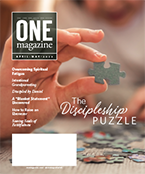
April-May 2023
The Discipleship Puzzle
------------------
|





A Road Named ZZ
By Brenda Evans
It was early February 1992. My husband Bill and I had just spent an hour with two second-opinion oncologists at Vanderbilt University Hospital in Nashville, Tennessee. A month earlier, a surgeon had removed three-fourths of Bill’s stomach because cancer had broken through the wall of his stomach and invaded nine of 28 lymph nodes. The pathologist was uncertain about whether the cancer had spread to other organs.
Bill’s oncologist, Dr. R, offered an experimental chemotherapy plan—if Bill elected to do chemotherapy. He had used the plan on two previous patients; both died within a year. So, he urged us to get a second or even a third opinion before we decided. We chose the two Vanderbilt oncologists.
The younger of the two, Dr. G, said there was no guarantee with Bill’s oncologist’s plan. He talked about numbers, chances, and statistics. The other, Dr. J, put his thumb and forefinger together to form a zero: Bill’s chances of survival. “But I never count God out,” Dr. J said.
“When you leave here today, make plans for the future, and I don’t mean plans to die.”
More like a theologian than a doctor, he added: “One more thing, Mr. Evans. There is something good about your situation that you do not realize right now. You are going to be acutely aware you are mortal and acutely aware of what mortality means. Most people never have that privilege.”
PRIVILEGE?!? That was the bitter best of Bill’s prognosis: the privilege of being acutely aware of what mortality means—mortality with its beastly underbelly of suffering, perishability, death, and its sting.
Until that February, I assumed a permanence to our lives. A certainty, a coherent longevity. Of course, I knew deep-down death was inevitable. It would happen to me, to Bill, to our sons and their wives, to our only grandchild, a beautiful curly-headed, two-month-old baby girl. But death was distant, remote, a provable theory that would bear out—someday, somewhere. But not here. Not now.
+ + + + + +
We didn’t talk until we hit the I-440 loop around the south side of Nashville.
“Did you hear that thing I told Dr. Johnson?” Bill asked.
“Which thing do you mean?”
“That God is able to heal me but not obligated to.”
“Yes, I heard.”
“I mean that, Babe. He’s not obligated to do anything for me. He’s done enough already. He doesn’t owe me a single thing.”
“I know, but I wish He did…owe you, I mean,” I replied. I knew He was not our magical god-in-a-bottle, our genie, but in that moment, I wished He were. I wanted to command, even beg Him to let Bill live.
“And I won’t try to bribe Him or make deals with Him either.”
“I know you won’t.”
We rode on. Cars whizzed toward and around us, everybody going somewhere, most a different direction than us, I assumed. A large flock of winter birds plunged and pitched, swooped and swirled just above the cars ahead, then spiraled sharply right and disappeared among a row of trees.
“God knows if one of those birds falls,” Bill said. “But He doesn’t always put out His hand to catch it.”
Bill was always one to speak in analogies. Truths were clearer to him that way. Sometimes his analogies confused me, but not this one, even though he didn’t say it all. Bill was a soaring bird. Disease had damaged his wings. Soon, he would plummet to the ground and die. As for God, He was not obligated to put out His hand, not obligated to lift one finger to stop that fall. That’s what Bill meant and what he believed.
“He can; I just don’t know whether He will,” he said.
“I know, I know.” Maybe God would, maybe God wouldn’t, but I didn’t say that aloud. Nor did I say, that to me, an equivocation is the same as a “no.” That’s how it always was in my childhood with my father. His equivocation never seemed to come out my way. It always ended with a no.
Looking back, I believe in that moment I was certain God would allow Bill to plummet from a living, breathing, thriving husband, father, and new grandfather to a dead one. From walking on the soil of this earth to lying beneath it.
But I could not say, “You are going to die.” So, I said nothing.
“He’ll pay attention, but He may not keep me from falling.” Bill was still thinking about the flock of birds. His usually strong voice was soft, too gentle. Although his eyes were dry, I felt he was weeping inside, maybe even silently begging, “Catch me, Father. Catch me.” But he said nothing more aloud.
“But you’re not a bird. You’re better than that. If that is His plan, I don’t like it,” I said.
“I never said I like it either.” His voice was steadier. “It’s just that He has always watched over us. He still is watching, and He will be in the future. Whatever He does or doesn’t do is all right. It will ultimately be good and good for us.”
“Even if it kills you?”
“Yes.”
We moved into an exit lane of I-440 and onto the curved ramp to I-24 East—a shift, a junction, a turn, an entrance ramp going a new direction. Instinctively, I grabbed the armrest, although I-24 East was a familiar road we traveled often. This day, the simple turn suddenly felt dangerous, a threat I could not yet define.
“Our boys will not understand if I don’t do chemotherapy, even if it doesn’t do any good or kills me,” Bill said as he maneuvered smoothly into the flow of traffic. I unclenched from the arm rest. “They will think I’m giving up without a fight, so I need to do it whether it helps or not.”
“I know, Babe; I agree, but you will be miserable, Dr. R says.”
“I can do it. I think I have to…for them,” he said.
+ + + + + +
That quickly, Bill decided to have chemotherapy. In the February whoosh of speeding vehicles, I strained to see ahead. There was a threat out there somewhere in the winter haze. I imagined the two of us, weaving along a yellow line on a hazardous road, not I-24 East, but some new, unknown road. Perhaps the road that passed over the rim of the world, where you fall from this world into another.
When Ben, our youngest son, was a small boy, just learning the alphabet, we were traveling US 60 in south-central Missouri. He spotted a narrow winding road named ZZ.
“Look! ZZ! That road is called ZZ,” he shouted.
“Yes,” I said.
“Where does it go?” he asked as we drove on by.
“If you take that road, Ben, you will fall off the end of the world,” I said.
“Really?”
“Yes.”
“Wow!” Ben said, his voice exposing small-child wonder. His two older brothers snickered at the ruse I had played on their little brother, but I was pleased with his curiosity and awe.
In early 1992, I learned there actually might be a road like the one that awed Ben. A road named ZZ that led to the falling off place, the end of our personal world. A road Bill and I had just decided we would take. A road where I couldn’t see the end or a way around or through. A road named ZZ.
+ + + + + +
Two years later, in mid-1994, Dr. R released Bill with these words: “Mr. Evans, if your cancer was going to get you, it already would have.” That two-year road was treacherous but doable by the Lord’s grace and healing. Bill still recalls those swooping birds on I-440 in Nashville 31 years ago and his words: “God is not obligated to do anything for me. He doesn’t owe me a single thing. He’s done enough already.” And He has.
About the Author: Brenda and Bill Evans live in Ashland, KY. Contact her: beejayevans@windstream.net.
|
|

